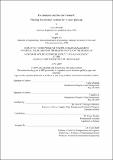E-commerce and the environment: Finding the optimal location for in-store pick-up
Author(s)
Alvarado, Carla; Liu, Yangfei
DownloadAlvarado_Liu_2019.pdf (3.165Mb)
Metadata
Show full item recordAbstract
In recent years, ecommerce has been expanding at an increasing rate. Many retailers are making efforts to improve their channel integration to enhance the order fulfillments for their customers. Therefore, companies often see network optimization as a key element within the ecommerce building. At the same time, more companies are trying to make their supply chains more sustainable, and transportation evidently accounts for a large share of CO2 emissions. Nonetheless, the trade-off between cost reduction and CO2 emissions reduction is often difficult to determine, and even harder to see as a tool for a company to make strategic decisions.
Our research focuses on an American department store chain with the aim to select the optimal stores as pick-up spots and evaluates the environmental impact of the findings. We use more than 10 million records provided by The Company and develop a binary integer linear programming model to estimate potential savings. We perform a sensitivity analysis to analyze the impact of the customer’s decisions in both economic and environmental magnitudes. Results show the significant importance of two variables: the customers’ willingness to travel and pick up their packages, and the customer’s willingness to avoid using a motor vehicle. Our results include savings of $77K in Massachusetts and $1,319K in California. Finally, with this analysis we provide recommendations for implementing the order-online-and-pick-up-in-store mode in a sustainable and cost-effective way, including educating the customers in using more environmentally friendly transportation modes.
Date issued
2019Keywords
Retail, Environment, Last Mile, Urban Logistics